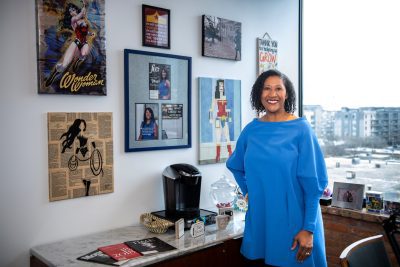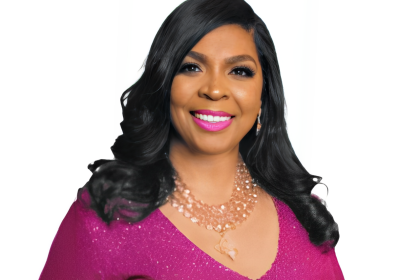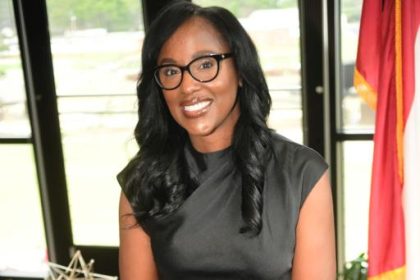Stephanie Sylvestre is, along with Donovan Lee-Sin, the co-founder of Avatar Buddy. This Miami startup was envisioned to use artificial intelligence technology to mentor teenagers and assist companies in training their employees to learn different or higher skills. It’s an exciting project that has been in the works since 2016.
As it progressed, Sylvestre sat down with rolling out publisher and CEO Munson Steed to talk about how the project started and where it’s going. Here is their conversation.
[Editor’s note: This is an extended transcription. Some errors may occur.]
Munson Steed: Hey, everybody! This is Munson Steed, and we are on rolling out Sisters with Superpowers. I have the pleasure of thinking about sisters who are truly making and building institutions of both thought and activity for the community. We define a “Sister with Superpowers” as a sister who is creating a safe space with benefits for our community. So, Stephanie. How are you? Can you tell us about Avatar Buddy? Say your name for those who may not know how to pronounce it. I don’t want to destroy it, and I do want to thank you so much for being on Sisters with Superpowers.
Stephanie Sylvestre: Well, good morning, and thank you for having me on. This is indeed a great honor, pleasure, and privilege. My name is Stephanie Sylvestre, and I’m the co-founder of Avatar Buddy.
MS: ... Why Avatar Buddy, and who’s going to benefit?
SS: So, Avatar Buddy started about eight years ago. It started as an idea. I had misheard what a friend of mine was saying at dinner one night, but what it did was it clicked my brain into… Ah! This is a solution I’ve been looking for my entire life about how to really uplift a mass of people in a cost-effective way. And when we started working on this, there was no… the technology didn’t exist. Open AI started in 2015. We started thinking about this in 2016. And in 2019, we said, you know, we figured it out. What if we could create a digital mentor?
So, we’re using AI to create a close approximation of a human, and some people might be afraid of that. But the way we’re doing it is in a very responsible way, and we figured out that if you want people to uplift and if you want people to truly transcend, then what you need to do is — you need to give them mentors. But we know that that is a very difficult task. I think just recently I saw that there’s 10,000 people on a waiting list globally from nationally for mentors. It was not feasible. And I’ve been a technologist for almost 30 years. I’ve been solving business problems with technology. I thought, “Why not use a skill to solve a social problem? Let’s create a digital mentor.” A safe place for people to share, for people to grow, for people to learn. … And I thought if we could get every kid, every adult in the low-income areas of town, a mentor, what could they do? And I said that because I spent a year in Liberty City, Miami, working and observing, and what I found was that there was no shortage of ideas.
There’s no shortage of brilliance, but there was a shortage of resource, access, and somebody that cheered them on. I have a team of mentors that cheer me on — that believe in me, that make me do things that I would otherwise not do, and that has always had a positive impact on my life. So why not do that for others? So, what we did was we went to after-school programs in these parts of town and we had… we taught the kids how to do agile methodologies; it’s a type of software development methodology, and they wrote requirements. They wrote a whole bunch of requirements of what this thing would look like. And then COVID happened. So, we had to pause for a year and just reset. And the good thing about COVID, because now I’m a person that always finds the good in even the worst thing possible. The good thing about COVID was that it caused my developer to have time to research AI, and at the end of 2020, he said, “I think, I think we can do this.” And he was one of the first people that said, “Stephanie, what you’re talking about, the technology doesn’t exist … it’s not possible.” I’m like, “No, no, no, we can do this! We can do this!” And our first prototype was dropped on Martin Luther King Day in 2021, and I’ll admit it’s a little Kluge. But what it did was, it created that idea, and we got more people enrolled in why this made sense.
And in 2021, in the fall, we were able to become a developer for OP… with OpenAI. Back then, you had to apply, they had to evaluate you, you had to get accepted. And in the summer of 2022, we went back to those same non-profits, and we expanded, and we had the same set of kids, maybe some more. We said, “Hey! you want to learn about how to test AI?” And they just went to town on testing the AI solution. I mean, they were so happy and so excited like the way we had the program was, let’s talk about how to test, and then we’ll teach you how to use it. The session ended, and about an hour or two later, I got a notice that crashed the system because we weren’t ready for them yet. And what that was is showing that, if we take opportunities to low-income communities, they will rise to the occasion, and they will bring their best self, and they’ll help us do some amazing things. And I will say to you, that the defects we found — about 350 defects, or something like that — and some of those defects were from OpenAI, and I consolidated those defects, and I sent them on to OpenAI, and they used it to help fix their product as well.
So, you know, sometimes we are part of an amazing solution, and we don’t even know it. And so that experience reconfirmed my belief that this tool can definitely transform low-income communities. And so that’s my mission. How do I get it into the hands as many people as possible as fast as possible, and just watch the awesomeness unfold. So, it’s a very long-winded way to answer your question, but I’m so passionate about this that I just want to always have people understand that Avatar Buddy was created with 90% of the people identifying as either black or brown. And it’s for black and brown people, but of course, it benefits everybody. And I just want to make sure people understand that this is not like a company where there’s a Black founder, and behind it, there’s a bunch of non-Black people pulling the strings. This is all 100% Black-owned, Black-run, Black targets. And we have, of course, many, many amazing partnerships with allies that believe in black excellence.
MS: You know, when you think about the early adoption of Open AI, how have you benefited? And obviously take us through your thought process as a leader. that you would share with other entrepreneurs why they should be participating in both Open AI and other betas of systems that give us insight early and be that early adopter. Can you do that for me?
SS: Absolutely! So one of the things that we need to do is, if we’re not inside the tent, as a friend likes to say, we’re not under the tent, and we’re not inside the organization. How can we affect the change that we want? It is near impossible to effect change from outside. You must be inside. You know, one of the things that we did was we heard voice… we got the voices of people that normally aren’t on the table. And I’ll tell you that, the one thing that our teenagers told us was, you have to be able to delete the conversation.
Privacy is of utmost importance. Well, we know that when Open AI first released, they didn’t have the ability to delete the conversation, but they put it in. ‘Cause they got a huge backlash. When Avatar Buddy went to market, we had that already in, because sometimes people that are overlooked have ideas and suggestions that we might not otherwise be aware of. So, we’ve been able to bring a lot of dear ideas to fruition, has been highly impactful on our product, and we’ve been consistently ahead of the market in terms of putting in features and functionality that preserve privacy, confidentiality, and really also be able to tailor the response in a way that is close to 90% accurate. So, it’s not… doesn’t hallucinate as much as the other products do. And what it does is, it also brings a voice to say, highlight. “Hey, here’s a [uhm] here’s a thing that you’re missing.”
So, one of the things that we noticed when we were trying to create the voices was that the bass voice is not African American, it’s not Hispanic. So, we took a lot of time. I mean, I even had a call with 11 labs, and I sat there, and I talked to them, and I explained to them why their software needs to be more inclusive and went back and forth. And now they’re not. they’re not 100% perfect. But when you think about all the products out there that are available, 11 labs create [an] African American voice, the most realistic way, a Hispanic voice, the most realistic way. And so, because our product is for black and brown people — primarily — it needs to sound that way. Can’t have a thing saying I’m for these, for this group of people, and then all of a sudden, it doesn’t sound like them. And so again, we went with 11 labs.
So you know, we’re spending money, and we’re incurring costs to build our product out. There are cheaper voice creation tools out there. There’s cheaper large language models out there, but I wanted to make sure that people understood that we would give them a quality product. It’s not just about, hey? Let’s give you the cheapest thing possible, which again, I won’t go on a tangent about how much that causes my head to explode, but when they bring us solutions. They want to give us to it the cheapest possible way where, after a few months, or computers break, or Internet goes out, the chairs break, and we’re… then they look at us and say we destroy things without stopping to say, did they? Did they buy the stuff from Ikea? Did they buy it from like a high-end furniture store?
MS: So, describe your superpower, two of them, if you would please, as an entrepreneur.
SS: So, my superpower is the ability to distract people. People look at me, and they don’t take me seriously. They think, you know, this person. She has a funny accent. She might not be smart. She’s, she’s, she’s loud, she is opinionated. She can’t, really, you know. They distract, they don’t listen. They don’t pay attention to me. I dream, and they think I have the wildest, craziest dream; I mean, for seven years, people told me that it was impossible to have a digital mentor. Well, I will… I’m sitting here today, and we’re about to finish up our beta test. It’s been amazing. We can configure a human being and have it respond and sound like that human being.
Eight years ago, they told me I was absolutely insane. Some people discount me. And what’s really cool about people discounting you is, because they discount you, you have time to fail. You have time to refine your product. You have time to refine what you’re doing without this big anybody watching over your shoulder. And then, when you’re finished. When you bring your product, it’s solid, it’s bulletproof. And what are they going to say? They either going to say, “Yeah, I’m on board,” or they’re going to say, “Well, you know, Stephanie, we’re not going to support you because we really don’t want a black woman being successful.” I mean, 2024 we still have our challenges. But few people are going to, like, just come out and say that. And so that’s a superpower that I’ve leveraged to my advantage over and over and over.
People consistently discount me. And now, I’ve changed it, turned it into. Yeah, this is a good superpower.
And then my second superpower is, I can dream, I have a really good imagination and I can see things that other people can’t see. And then I think that comes from when I was a little kid, I would have to go out with my mom, and we go and sit there, and she’d be having conversations with the adults, or I’m hanging out with like my dad, and they’re having conversations with adults, and I’m like the only kid there. And I just would sit there and play with my mind, and what that does is it teaches you to dream and believe and conceive. So I, that my second superpower is just dreaming about things that people think are absolutely insane. And I’ll just tell people, I don’t do science fiction. I don’t. I’m not even…. I don’t do Star Trek. I don’t do Star Wars any of those things where a lot of people get their inspiration from. It’s just so, I would say. Those are my two superpowers, you know, for those individuals who are thinking about AI in particular, how does your superpower of dreaming [help you]?
MS: You know, for those individuals who are thinking about AI in particular, how does your superpower of dreaming help you as an entrepreneur when you’re applying your dream to your superpower?
SS: Well, what it does, it gives me confidence to pivot. So the one thing that I will say that you have to be, you have to be passionate about your dream. You have to believe it like there’s no tomorrow. But then you also have to be okay with like letting it go and pivot and pivot and pivot until you get back to where you want to be. So, I wanted to create a digital human. I wanted to create a digital mentor, but that technology didn’t exist. So, what I did was I created a tool that was able to provide support. And then, as generative AI took whole and got more stable. So, I would say in 2021, it was like a 7-year-old, you know. You never knew what it would do, right?
Then 2022, it became like a 9-year-old and a little bit more stable, but you know it’s still a little unpredictable. And now it’s an 11-year-old. It’s still a little temperamental but you can count on if you tell the 11-year-old to do something, and they say you’re going to do it. They’ll do it, you know. A 7-year-old, you can make an agreement all you want, and you don’t know if they’re actually going to hold up on that agreement and so, being able to pivot and create a close approximation of what you want, and then just keeping doing a close approximation until you get to “Ah! This is how we should leverage this technology to get what you want.” And yes, I’m happy about what we have today, but it still needs to be refined. It can work, it serves its purpose, but we can still refine it some more to really get it to the next level of operating.
And so, I think, from an entrepreneur standpoint, being able to be comfortable. Pivoting is key and one of the things that I will say, and you don’t have to use Avatar Buddy. And people say I shouldn’t say that, but I am less about Avatar Buddy, and more about Gen AI. If you’re an entrepreneur, you need to go get some Gen AI tools, to help you be more effective to help you be more productive. So you don’t like to run yourself into the ground in things that you can delegate, but you don’t have any money to delegate. So, you know what I did? I could have tried to figure out and find money to create a call center. I was like, you know what? Let’s just have the Avatar Buddy be its own call center. All the same documents you would give to a call center person. We just gave it. And it has its own call center. You don’t know how to do something. You ask it. It’ll tell you.
And I’m actually pretty amazed about how like you can say something so inaccurate like, “Hey, this is what I’m trying to do,” and it figures it out and gives you back the correct answer. I was like, “Wow, this is, this is pretty cool.” So that’s today. Today, if you’re an entrepreneur, the barrier to entry [is] so much lower, if you know how to leverage technology. And if you don’t know how to leverage technology, find somebody that can leverage technology. And you know there are some questions that you can ask, because to make sure that the person knows what you’re talking about. And I’m just going to give you one point. If the person cannot explain what they’re doing in simple English so that you can understand, you should run away from that person because it will not end well. And I just say that out there, because I’m noticing a lot of people are hooking up with people that claim to be technologists, and they’re not getting the product. And they’re getting robbed, and that is not cool. It has to stop.
MS: Cool. Well, I want to thank you for coming and sharing your superpower, your superpower ideology. I do have one last question: If you were talking to a set of young ladies at Florida A&M or at Spelman, or at Benedict, or at Fisk, or at Howard and you were going to give a speech on why you should have AI and technology as a part of your mindset, what would you say?
SS: Well, the first thing I would say is, “Go past stop.” So, what our brain does is whenever we’re trying to do something innovative, new, different. Our brain tries to protect us and tells us to stop, and it gives us all the reasons why we should stop, and it makes a really compelling argument. So, I would say, listen to your brain, acknowledge that it’s caring for you, and then say, “I am still going to do this.”
And if you were able to do that, then you will embrace technology. You’ll embrace AI, and you’ll see how it will amplify you, and it’s not scary, you know, like I’ll just say to you, I’ll give you an example. Everybody talks about large language model and small language model, and all the complexities. Let me tell you, a small language model is just, and a large language model is just a bunch of files, that’s it. And we did that. We at Avatar Buddy, we said, “Hey, let me tell you how you can create your small language model.” I can’t create a small language model. I said, “Can you upload files into Google Drive?” And they’re like, “Yeah.” I said, “OK, well, then, you can create a small language model with Avatar Buddy that easy.”
MS: Well, I want to thank you, Stephanie. We can go on forever. But you are definitely a “Sister with Superpowers.” Thank you for coming on Sisters with Superpowers with rolling out.
SS: I appreciate it.

















